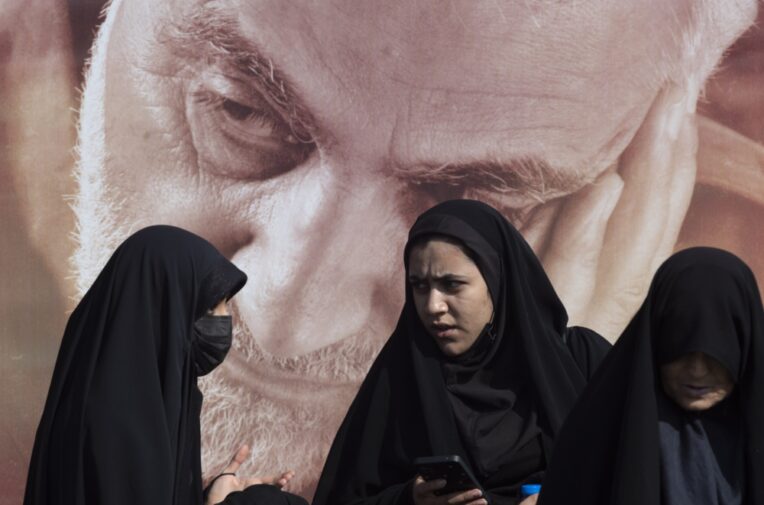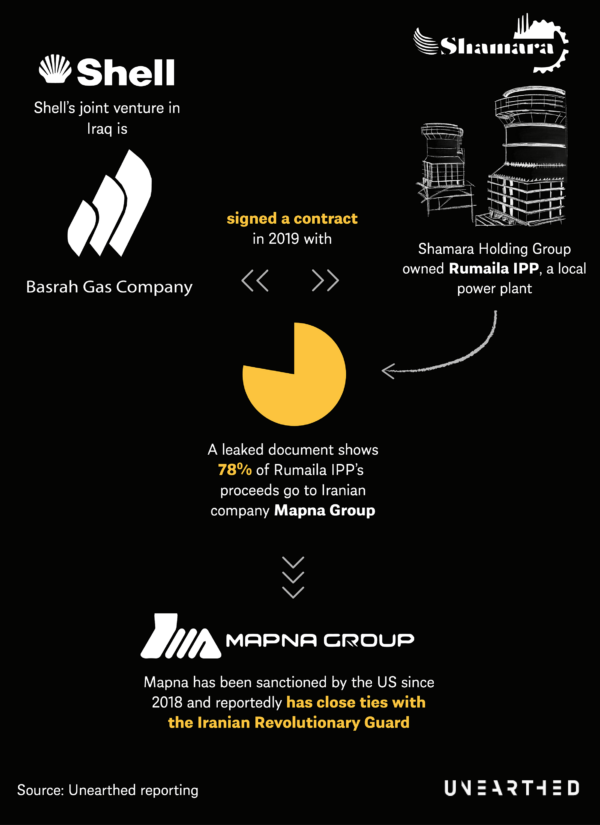
Iranian women stand in front of a portrait of former Islamic Revolutionary Guard leader Qasem Soleimani. Photo: Morteza Nikoubazl/NurPhoto via Getty Images
Questions for Shell over Iran links
Leaked documents show connections between Shell's joint venture in Iraq and Mapna, a company with ties to the Iranian regime
Questions for Shell over Iran links
Leaked documents show connections between Shell's joint venture in Iraq and Mapna, a company with ties to the Iranian regime
Iranian women stand in front of a portrait of former Islamic Revolutionary Guard leader Qasem Soleimani. Photo: Morteza Nikoubazl/NurPhoto via Getty Images
Shell’s joint venture in Iraq signed an agreement that could benefit a company with close ties to the Iranian regime, according to leaked documents seen by Unearthed.
The news comes with the Iranian government’s human rights record in the spotlight, following its brutal treatment of protesters and its military support for Russia in the Ukraine war. The documents also shed light on how Iran has come to play a key role in Iraq, both in its politics and infrastructure, in the 20 years since the US led invasion of the country.
The Basra Gas Company, a joint venture founded by Shell with the Iraqi government, was set up to capture the gas produced by southern Iraq’s vast oil fields. Iraq wastes much of its gas through flaring and is heavily dependent on Iran for energy. Shell describes Basra Gas’s work as vital for Iraq’s economic development and future energy independence.
In the summer of 2019, Basra Gas signed a deal with Iraqi company Shamara to receive electricity from the Rumaila independent power plant, which was built by Mapna Group, an Iranian technology company.
The Rumaila independent power plant is operated on behalf of the Iraqi government by Shamara, but according to a leaked document seen by Unearthed and the FT, 78% of the proceeds from the plant go to Mapna.
Mapna has been sanctioned by the US government since 2018 but Iranian companies working in Iraq enjoy a number of carve-outs from US sanctions due to the close ties between the countries.
Basra Gas and Shell both said they have no relationship with Mapna. Basra Gas said it pays the Iraqi electricity ministry for power and has had no contact with Shamara since signing the 2019 agreement with the company.
A Basra Gas spokesperson told Unearthed: “Basra Gas carries out comprehensive due diligence checks for all its contracts and conducts its business at high international standards. Our check didn’t identify any compliance issue.”
In a statement to Unearthed and the FT, a spokesperson for Shell said: “Shell is a shareholder in the Basrah Gas Company Joint Venture (BGC). As a non-operating partner, Shell does not have control over BGC’s operations but instead incorporates its ethics and compliance standards in the JV agreements. Shell seeks to comply with all applicable international trade laws including applicable sanctions and embargoes. Shell has no dealings with Mapna or any Iranian entity.”
Observers raised concerns over Mapna’s links to Iran’s repressive government.
Hadi Ghaemi, executive director at the Centre for Human Rights in Iran told Unearthed: “Firms like Mapna are vital for the survival of the Iranian regime. Historically, they have got foreign currency into the country, helping to bankroll the suppression seen in Iran today.”
Iran has been hit by a wave of protests since last September when a young woman, Mahsa Amini, died after being beaten by the country’s morality police. In a subsequent crackdown, an estimated 19,200 people, including many teenagers, have been detained and over 500 protesters killed, according to a House of Commons briefing.
Mapna has been linked to prominent figures in the Iranian regime. Iran’s supreme leader gave a speech talking about the value of enduring and evading sanctions from Mapna’s headquarters in 2014. According to testimony to the US Congress by a senior fellow from the Foundation for Defense of Democracies think tank, Mapna’s CEO, Abbas Alibadi, was a faculty member of Emam Hossein University in Tehran, a training ground for the Revolutionary Guards, an elite force within the country’s military.
Mapna was sanctioned by the US government under President Trump as part of wide-ranging sanctions on Iranian companies following his withdrawal from the Iran nuclear deal. The sanctions took effect months before Shell’s joint venture partner signed its deal with Shamara. It had previously been under sanctions from the British government for alleged involvement in nuclear proliferation.
The US Treasury did not respond to a request from Unearthed to clarify its position on Mapna and its attitude to the company’s work in Iraq. The UK Foreign Office also declined to share its position on Mapna with Unearthed.
Iran shares a nearly 1,000-mile-long border with Iraq and enjoys extensive links with the country, particularly in the south where most of Iraq’s oil reserves are located.
The 2003 invasion and the chaos that followed the fall of Saddam Hussein’s regime offered a power vacuum for Iran to fill. Now Iraq pays its neighbour billions each year to be supplied by gas to fuel its beleaguered electricity grid.

Iran’s level of influence in Iraq has long been controversial, both internationally and domestically. In September 2018, rioters attacked the Iranian consulate in Basra after days of protests against government failings and perceived Iranian influence on the Iraqi state.
Anahita Hosseini-Lewis, a researcher on the Middle East and international relations at the University of Sussex, said: “Companies like Mapna profit from Iran’s natural resources, and then the money ends up in the hands of the political elite. This story matters for the citizens of Iran and Iraq.”
Shell has had a presence in Iraq for more than a decade. However, flaring in Iraq has remained high throughout that time, with the country consistently rated as the second highest flarer in the world, behind Russia.
As part of a major investigation published alongside BBC News Arabic in September, Unearthed revealed that giant plumes of the superheating greenhouse gas methane were spotted over a Basra Gas facility in October 2020, raising questions about the firm’s green credentials. In response to that story, Shell said that the incident was exceptional and that new technology was being installed to prevent such incidents in the future.
A spokesperson for the World Bank’s investment arm, International Finance Corporation, which provided Basra Gas with a $360m loan to support its flaring reduction work, said: “IFC’s financing to Basrah Gas Company does not extend to any entity under any international sanctions.” They added: “IFC’s loan terms limit the use of IFC funds to the construction of the Basrah Natural Gas Liquids processing plant.”

